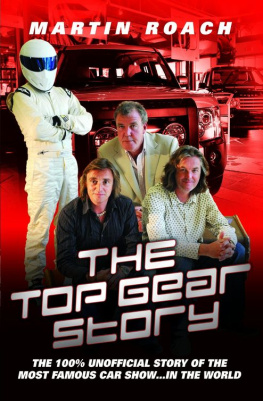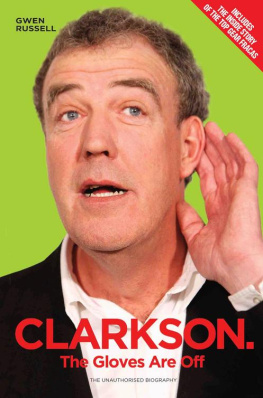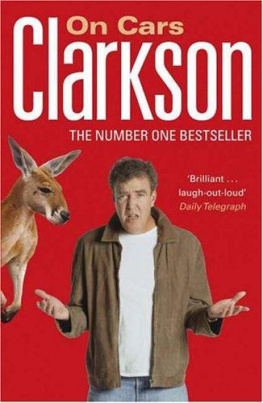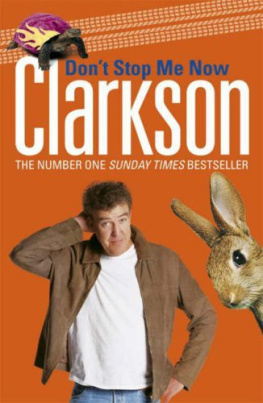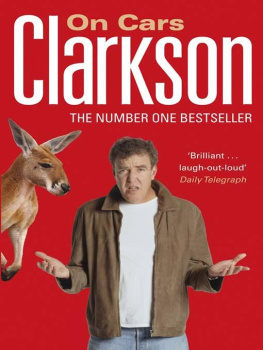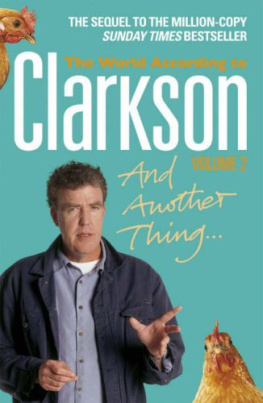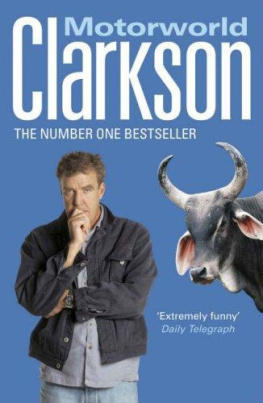The author would like to generously thank Jon Bentley, David Coulthard and Dr Kerry Spackman for their interviews. Top Gear has, of course, been the subject of huge media coverage and the following sources were extremely helpful in compiling this book: The Sunday Times, the Guardian, the Independent, the Sun, the Daily Mirror, the Daily Mail, the Daily Telegraph, the Daily Express, The Man in the White Suit by Ben Collins,
Flat Out, Flat Broke by Perry McCarthy, Top Gear magazine.
Also the brilliant fan site www.jeremyclarkson.co.uk,
www.timesonline.co.uk, style.uk.msn.com, news.bbc.co.uk,
www.petitiononline.com, www.hse.gov.uk,
www.thefutoncritic.com, transmission.blogs.topgear.com,
www.finalgear.com, www.c21media.net, web.archive.org/web,
www.webcitation.org, news.scotsman.com, www.smh.com.au,
www.theage.com.au, www.carsguide.com.au, jalopnik.com,
www.vogue.co.uk, findarticles.com,
www.computerworld.com.au, www.newstatesman.com,
uk.askmen.com, www.imdb.com, www.brunel.ac.uk,
www.thesun.co.uk, homecinema.thedigitalfix.co.uk, wikipedia.com
The official Top Gear website is at: www.topgear.com
W hen I was a kid, my dad drove a chocolate-brown Hillman Hunter. It had shiny, faux-leather seats and no seatbelts in the front or rear. The music system was a cartridge player which took up most of the dashboard, yet we only had an album each by The Carpenters and Elkie Brooks to play on it. Us three kids would be crammed in the back and to this day, I dont know how we fitted everything in. We even drove to the south of France to go camping during two particularly ambitious summers with a tent and two weeks supplies for a family of five in the boot. Im not actually sure thats physically possible, because now Im a grown up, I seem to need a car the size of a small fuel tanker to get my small people around (which is still always full when we come back from Sainsburys). But back then, the trusty (rusty) Hillman got us all in, suitcases precariously tied to a creaking roof rack, and off we went over the Channel. I think it took us about 79 days to get there the first time.
My dad used to fix cars on an evening after work to bring in extra money to feed his hungry hordes so my primary-school years were a time when cars were a piece of metal to get you from A to B or to generate cash for a new pair of shoes. They were a pragmatic assistant, a necessity and nothing more. For much of my early years, I had absolutely no idea there were car brands and the cach of a so-called prestige marque mattered not one jot because it didnt even register. Besides, even if I had pined for a classic badge, we simply couldnt have afforded one.
In compiling this book, I have tried to pinpoint exactly why it is that Top Gear is so massively popular. At the time of writing, somewhere in the region of 350 million people watch each episode. Thats almost as many as Baywatch, yet Jeremy Clarkson, James May and Richard Hammond are certainly no Pamela Andersons. Of course there are several fairly obvious reasons: the brilliant presenters, the ludicrous stunts and adventures, the road-tests, the irreverent humour and bitingly funny scripts, all these things are core staples of a globally successful formula. But theres something more, something a little more nebulous: its the fact that for some reason, to a sizeable chunk of the worlds population, cars matter.
I remember vividly the very first moment when I suddenly realised this phenomenon. It was like a cloud of ignorance lifting from my eight-year-old eyes I suddenly understood that certain cars were deemed better than others. It happened when the music teacher at primary school bought a new car. I remember sitting in the maths class and one of the trendy kids walked in and said, Guess what? Mr Hanley has only gone and bought a Saab 900 drop-top! I didnt know what he was talking about. After some explanation, I realised he meant to say, Mr Hanley has only gone and bought a new car with a convertible roof. But he hadnt just bought a car it was a Saab. And not just any old Saab, it was a 900 Series, no less and convertible.
Suddenly, the penny dropped.
Ah, I get it
A whole new world had just opened up for me.
Now, a good few road miles later, I sit here with that primary-school fascination for fast cars still burning brightly inside. When a supercar drives past me, I still emit the audible Oooohhhh that the voice boxes of all genuine petrol-heads are equipped with. Or sometimes I opt for the sharp intake of breath that works, too. When I recently saw a convertible white Bugatti Veyron in central London, I was quicker to stand next to it with my boys and get a photo than a stalker at a celebrity party.
I buy Top Gear magazine religiously and have a subscription to the kids edition, Top Gear Turbo in my sons name, of course and yes, I help him collect the trading cards. We once went to a toy store for a friendly card-swapping morning with fellow collectors and I nearly had to be escorted from the shop because a dad jumped the queue for the Lambo Murcielago LP640 (Rare). I was outraged on my sons behalf, of course.
As I type this, I have a Top Gear battery-operated V8 engine pencil sharpener next to my keyboard; theres a Stig key fob hanging from the door to my office; on the back of my mobile phone is a Top Gear sticker, which says Only Supercars Allowed; I have just had a shower with a Stig soap-on-a-rope and when Ive finished for the day, Ill drink a coffee from my Top Gear mug. Then Ill read stories to my boys after first ticking off the latest trading cards we have just bought. Afterwards my eldest will go to sleep in a Top Gear duvet. I havent quite sunk that low yet, but perhaps its only time they do make them in king size
And thats what Top Gear so brilliantly taps into: its some primal and at times totally illogical fascination with cars. I admit, when watching the show I do tend to drift no pun intended if the Top Gear team spend too long on a vehicle that takes longer than is decent to get to 60mph, but lets be honest, so do the presenters. That said, even when they are forced to focus on something that isnt supersonic, the way the programme reviews, tests and discusses all types of car is truly unique. However, its the three presenters own schoolboy passion for cars that is the biggest single draw for most Top Gear viewers. Sure, they have a massive knowledge of the machines they are testing and are all very accomplished drivers yet its their child-like enthusiasm and playground camaraderie that is most infectious of all. Had Clarkson, Hammond and May been in my maths class that day at school, they would have been the first ones to jump up from their seats and run to the window to gaze adoringly at Mr Hanleys new Saab. Years later, they are effectively still doing exactly the same every Sunday night on our television screens.
I knew I had probably overdone the petrol-head life when my youngest, then aged two-and-a-half, saw his new pram and asked, Daddy, can we get black alloys? I make no apology for this because I know that my little racing drivers understand, the presenters of Top Gear understand, the brilliant behind- the-scenes team at the show understand, and the millions of people all over the world who tune into the show every week also understand: Top Gear will be relevant and popular for as long as there are cars.
Martin Roach
W ith the ubiquitous success of the current version of Top Gear, its easy to forget that the show has a long and illustrious history. In fact, the first generation of

